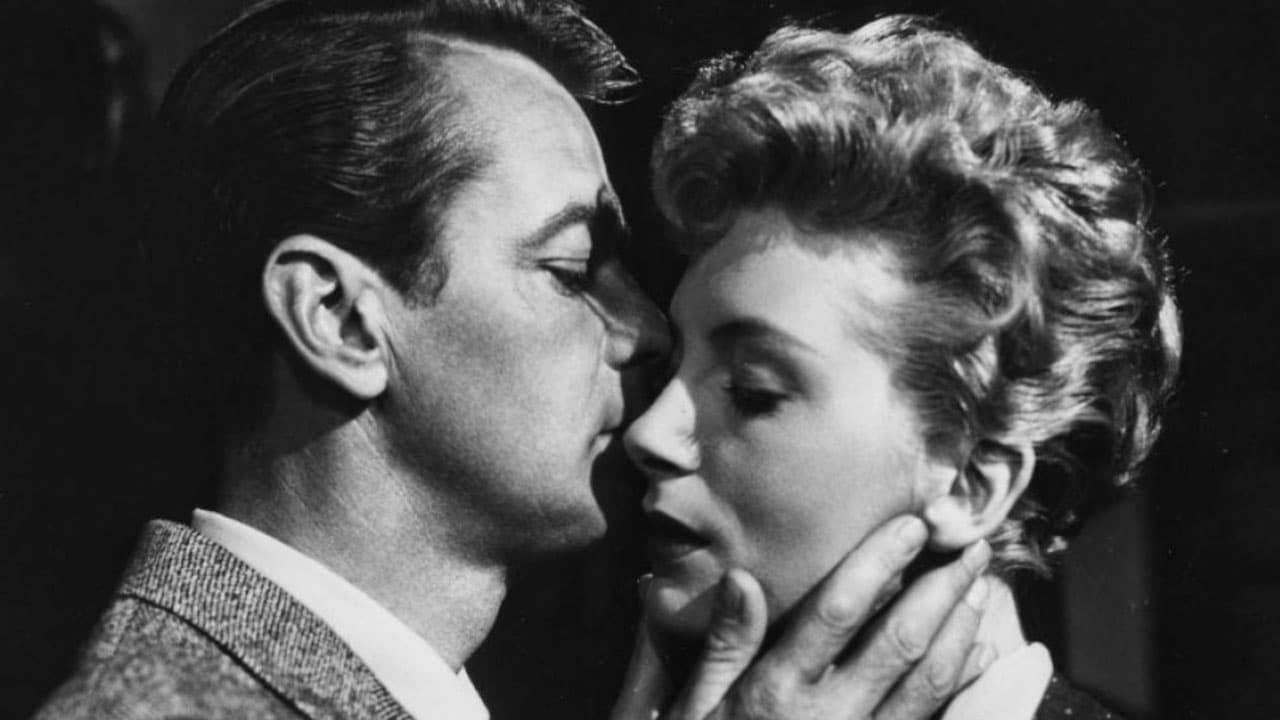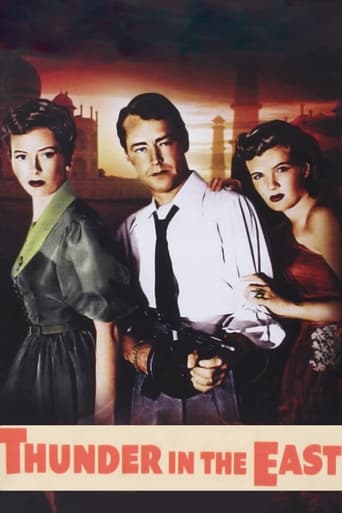

In 1951, Charles Vidor directed a film called "Rage of the Vulture" at Paramount. Set in the first days of Indian independence (1947), the Jo Swerling screenplay (adapted by George Tabori and Frederick Hazlitt Brennan from the novel by Alan Moorehead) tells the story of a gun-runner (Alan Ladd), a blind Englishwoman (Deborah Kerr), a French adventuress (Corinne Calvet), a pacifist statesman (Charles Boyer) and a group of English residents (Cecil Kellaway, John Williams et al), who are cut off from civilization by hostile tribesmen. This film was shelved for over a year in the hope that political events in India might make fora welcome a load of free publicity. But as nothing newsworthy actually occurred -- or even seemed likely to occur within in the near future -- the picture was eventually released as Thunder in the East in January, 1953.As expected, the movie failed to attract picture-goers, even though Alan Ladd was about to enter a period of super-stardom.
... View MoreThunder in the East (1952)If you like old Golden Age Hollywood movies you've seen a bunch of this kind of film by now. An American is overseas in an exotic place where people of various nationalities are finding various ways of surviving, some legit and some underground. The cross of cultures, and the rising of a new situation that threatens them all, is the basis of high drama and lots of new material. Think "The Letter" with Bette Davis, or much closer to the point, "Casablanca" with Humphrey Bogart.In that mold we have Alan Ladd as a gun runner, an American with no loyalties except money. The place is Ghandahar, a province in northern India, a country recently independent but with lot of Brits hanging on to their old ways (and made fun of a little). We presume this to be a Hindu controlled area, because there is a Muslim insurgency in the mountains. It's set in the 1947 and what politically is about to happen (and the audience in 1952 knows this) is the big breakup of the new India into two countries, with Muslim Pakistan born in the north.So Ladd drops into this tiny province with a plane full of armaments. He aims to sell them to the Hindu leader, played by Charles Boyer. But Boyer is a pacifist deep down and he refuses. By then it's too late to leave, and the insurgents are about to arrive, and worst and best of all, Ladd meets a woman, played by Deborah Kerr, who happens to be blind.This is both great stuff and also in danger of feeling contrived. For one thing, Ladd is no Bogart, and sometimes I think he thinks he is (he plays the hardboiled type who doesn't take advice from anyone). But the movie is no "Casablanca," either. It is however very good, with the romance and the military takeover jolting over rough territory. Kerr is a bright light here, a British woman born there and in love with the place, and with a better sense that the region is not theirs. Even so, she doesn't want to leave. And guess who has a plane?Well even that goes wrong (badly), and tensions build. The existence of the guns is an ongoing problem. Night comes. Their situation looks dire. And then, in a crazy Warner Bros. style ending that is worth every minute leading up to it, we have this amazing, ambiguous, catastrophic rising to action. It might not be reasonable, but then again, in a situation like this, it might be exactly what you'd expect. Or that there would be no choice. Either way, the camera shots in the final scene are terrific and surprising stuff.The director here is Charles Vidor, one of the long lived mainstays who made a lot of really good films but maybe no stellar ones (the best is probably the noir set in South America, "Gilda"). Vidor seems to be drawing from well used and still workable clichés to make the story vivid cinematically. It's actually a good ride. I happen to see that TCM viewers give it a very high composite score. I think this would be a terrible entry into older movies, but if you are already a fan, it's much better than you might expect. I give it a go.Oh, I realized after re-reading all this that the mythical Ghandahar is an homage to the pacifist Indian leader, Ghandi...a nice addition.
... View MoreI guess the 1952 audience was certainly not satisfied with the ending,which abruptly comes as the heroes are still in action. Ending a movie like that was not obvious at the time.The biggest flaw is French actor Charles Boyer,ridiculously made up as a Hindu.This character,a Gandhi disciple, puts forward wisdom,prayers,peace and love to cowardice and reactionary mind (the English) greed(Alan Ladd's character) , violence (his brothers ,the rebels),and complete irresponsibility (the caricature of a maharajah).He's the only positive character of the story along with the minister and his blind niece (Kerr).It's absolutely impossible to believe Boyer is an Indian ,mainly if you've seen him as a French lover!Besides,he finally demonstrates the opposite of what he stood up for . Ladd's evolution is predictable,from a greedy businessman to a hero (thanks to the blind girl of course).One should notice that Deborah Kerr is too great an actress to play such a poor part that would be suitable for a B movie starlet.Her intellectual playing does not match with down-to-earth Alan Ladd.The movie also suffers from a shoestring budget.Take George Cukor's "Bhowani junction"(1956) instead.
... View MoreThunder in the East is set in 1947 India ,immediately after being granted independence by Britain ,and in particular events are centred on the state of Ghandahar which is being menaced by brigands,well armed and with a political agenda. The Maharajah of the state is a dilettante playboy ,and his main adviser,played by a blacked up Charles Boyer,is a pacifist who will not countenance using force to resist the incursions of the brigands. Thus when arms entrepreneur Alan Ladd seeks to sell him guns and munitions to resist the enemies of the state he refuses and impounds the cargo.Ladd's existence is further complicated by his falling in love with Deborah Kerr,a blind British woman .who is caught up in the fate of the British community which is particularly under threat from the rebels. Things build to a final siege of the main hotel where the British dig in to resist Performances are okay although white actors blacked up now seems embarrassing ,and there is a touch of Casablanca about the storyline -cynical hero falling in love with an idealistic woman;contending political forces and a smarmy villain.Its nowhere near as good since script and cast are inferior .Not bad but too stolid to be exceptional.
... View More